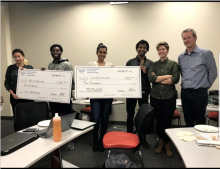EECS 98 : Inclusive Pathways Into Tech and Entrepreneurship
Course Description
The Inclusive Pathways into Tech and Entrepreneurship was a semester-long course in the Electrical Engineering/ Computer Science Department at UC Berkeley. The course featured weekly guest speakers hailing from traditional and non-traditional backgrounds in the tech industry. The aim of the course was to expose UC Berkeley students of all majors to new pathways into careers in technology. The primary goal of the course was to get humanities & social science students together with engineering students to learn about how they can work together on projects and ideate products for social good. My goal was to encourage STEM students to learn about ways they can look at their discipline from a humanities angle, and social science and humanities students to learn how they can use their skillsets to the tech industry.
Key Take-Aways
- The course successfully achieved a gender-balanced enrollment
- Course participants self-identified as from underrepresented backgrounds such as African-Americans, Latinx, and first-generation students
- Reading student evaluations on guest speakers, students enjoyed hearing the personal stories of speakers’ career trajectories
- Students were invigorated to learn about untraditional positions at tech companies
- Students who were in non-tech majors could see themselves in the tech industry
- Students from engineering and other STEM majors reported that they learned about a new technology
- By the end of the semester, students reported that they found getting a job in tech to be less difficult and learned about “non-stereotypical” roles in tech
- The final project for this course was a product pitch in front of two Big Ideas judges. First place was a tie for a domestic violence education app called “Unravelled” and an economic opportunity and financial literacy app addressing African American economic growth named “Blackbook”
Creative Discovery Course Grant Experience
All but one student surveyed felt like they learned about a new technology. The course leveraged the Creative Discovery Grant funds to pay for student membership to the CITRIS Invention Lab so that students could learn skills such as laser cutting and 3D printing and get assistance on a prototype of a product idea they had. Over 60% of students had not heard about the on-campus resource of the CITRIS Invention lab which allows students with no technical background to design and create a prototype of an idea they have with the help of an engineer. The course exposed many to a valuable campus resource for innovation.
Despite many students coming from Electrical Engineering and Computer Science, this suggests course was not repetitive for STEM majors and exposed students from tech and non-tech majors to new technologies.
Instructional Materials
